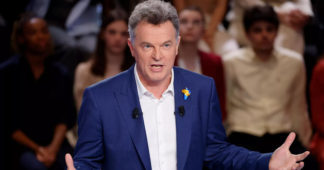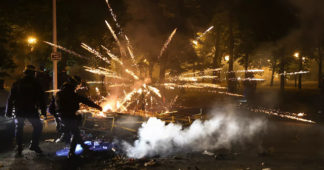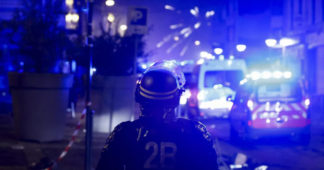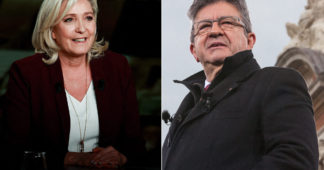France’s left has often failed to speak up for marginalized minorities. But after the backlash over the police murder of 17-year-old Nahel, left-wing parties have taken a clear stance, refusing to condemn rioters and insisting their anger is justified.
By Mathieu Dejean, Christophe Gueugneau
Translation by David Broder
Jul 1, 2023
Back then, when the banlieues were set ablaze by the deaths of Zyed Benna and Bouna Traoré as they fled from the police, the political class was at best indifferent, at worst totally surpassed by events. While then interior minister Nicolas Sarkozy fanned the flames of youth hatred with talk of “blasting the streets clean,” “scum,” and “zero tolerance,” the Socialist Party (PS) aligned itself with the government’s positions: the priority was the unity of the Republic’s main political forces (it only abstained from voting on the state of emergency).
Even the far left felt “little invested in cars being torched,” sociologist Michel Kokoreff, professor at University of Paris 8 and author of La Diagonale de la rage, told Mediapart. In a 2007 study sociologist Véronique Le Goaziou wrote that the far left had “been conspicuous by its absence during a large part of the riots.” She noted the “silence of far-left groups,” but also “the embarrassment, even cacophony of the governing left (Socialist and Communist Parties),” which had “left the rioters deeply isolated politically.”
2005: Deafening Silence
“In 2005, the France 2 news first talked about the scandal of the burned-out cars, then the death of the children, and the political reactions were all aligned with this hierarchy of information. There was a consensus in the call for calm, which left these children absolutely alone,” recalls anthropologist Alain Bertho, a specialist in the phenomenon of riots. “The prevailing idea was ‘working classes, dangerous classes’: we had such an outsider’s view that we didn’t understand,” agrees Coquerel.
Nearly twenty years on, something may well have changed. If the left-wing parties are still dizzy from the expression of popular anger over the last three nights, they are now sharing their amazement with understanding.
Despite the avalanche of accusations of “anti-cop” hatred from the Right and far right, and Interior Minister Gérald Darmanin’s haughty calls for “the professionals of disorder” to “go home,” the left-wing parties’ condemnation of police violence is unanimous, and they are finally putting words to the causes of the anger being expressed.
After former prime minister Manuel Valls — still widely presented as a man of the Left (despite his record in office under President François Hollande in 2014–16 and later outspoken support for Macron) — criticized LFI for “blowing on the embers” with a view to “taking political advantage,” France Insoumise MP Alexis Corbière told Mediapart: “If you think people are going to burn down a police station because they read a tweet, that’s a conspiracy-theorist way of seeing things, which ignores the social reasons behind these conditions. People have lost their lives, and the way it’s been handled hasn’t given the families any confidence. The police force needs to be rebuilt, and its control body cannot depend on itself.”
At the Socialist Party, which as late as 2022 still rejected “the use of the terminology ‘police violence,’” its line is shifting — and it’s not giving an inch to accusations that this language is inflammatory. Emma Rafowicz, party spokeswoman and president of the Young Socialists, defends the use of these words: “It’s the reactions of the Right and far right, who only condemn the riots and judge that it’s too early to comment on Nahel’s death, that are fueling a huge wave of anger. We understand this anger, which is political. We’re a long way from peace and calm. We do need to find solutions to calm things down, but these reactions are the opposite,” she tells Mediapart.
Slow Recognition
Even if there are differences of opinion on the Left about the need to call for calm or not (“My Insoumise friends are wrong not to call for calm, they’re reacting like people who don’t live in working-class neighborhoods,” says the Socialist president of Seine-Saint-Denis, Stéphane Troussel, for example), Bertho believes that the attitude of this political camp bears witness to a “real shift” compared to 2005.
There are many reasons for this change. First and foremost, they are rooted in the experience of police repression that social movements and political activists have had to endure in recent years.
“The mobilization against pension reform and, before it, the ‘gilets jaunes’ made this militant generation aware of the unpunished police violence that neighborhoods have been suffering for years. The considerable intensification of police repression has demarginalized these young people and these neighborhoods, and changed the way we look at them today,” Bertho details. Coquerel agrees: “What the working-class neighborhoods have been suffering for years, others are suffering today, even if not with the same severity. So everyone understands that it’s the same social order that’s at stake.”
What’s more, for several years now, links have been forged between traditional labor movement organizations and movements from working-class and marginalized neighborhoods: for instance the Comité Adama (a campaign group first set up to seek justice for Adama Traoré, a young black man who died in police custody in 2016) led the “people’s rising tide” march in Paris on May 26, 2018.
Rebuilt Connection
During the 2005 riots, Ligue communiste révolutionnaire (LCR) leader Alain Krivine, a resident of Saint-Denis, recognized an elusive situation, “where dialogue is, for the moment, uncertain and we don’t have the means to pursue another policy.” Almost twenty years later, his political heir, Olivier Besancenot, spokesman for the New Anti-Capitalist Party (NPA), claims to be closer to the driving forces behind the Immigrant and Banlieues Movement (MIB) and the Comité Adama: “The revolt is there. Now, either we go into denial, that is to say, into a law-and-order response, or we start from the responses that come from the movements on the ground. Working-class neighborhoods are not political deserts. Left-wing parties need to assert their solidarity, and move away from paternalism,” asserts Besancenot.
From this point of view, Mélenchon’s recent presidential campaign also testifies to a change in the way left-wing programs take into account the inhabitants of working-class and marginalized neighborhoods and their situation. Former spokesperson for the Indigènes de la République, Houria Bouteldja, hailed a “France Insoumise remolded by struggles,” attesting to a political landscape that has changed since 2005.
In the political history of the former Socialist senator Mélenchon, this turning point came in 2019, when he took part in the march against Islamophobia: “There’s been a shift on his part on this subject, he’s cleaned up his act a little and, during the 2022 campaign, he pointed the finger at the issue of police violence, police impunity, and the necessary independence of the police force,” notes Kokoreff.
“Jean-Luc Mélenchon’s campaign, his tone toward the banlieues and Islamophobia, which is a dimension of what they suffer, has built bridges,” confirms Bertho. In fact, Mélenchon achieved a spectacular breakthrough in urban centers and their immediate suburbs in 2022.
However, there is still a yawning gulf separating the Left from the poorest housing projects — and we should be under no illusions about its ability to impact the course of events. Former Socialist interior minister Bernard Cazeneuve’s responsibility for the legislation allowing easier use of firearms by law enforcement has not been forgotten. Nor is the still-recent participation of the Socialists and Greens in the police union demonstration on May 19, 2021, in front of the National Assembly. On the Left, only France Insoumise did not attend.
Today, even if it has been muted by the shock of the video of Nahel’s death, this divide remains in the background, in the criticism leveled at the Insoumise who refuse to call for calm. Yet Coquerel is determined to put a positive spin on things: “Now, there’s a broad understanding on the Left that, whatever form anger takes, it’s about legitimate things, notably the use of the police as a tool for discriminatory control of people in our neighborhoods.”











